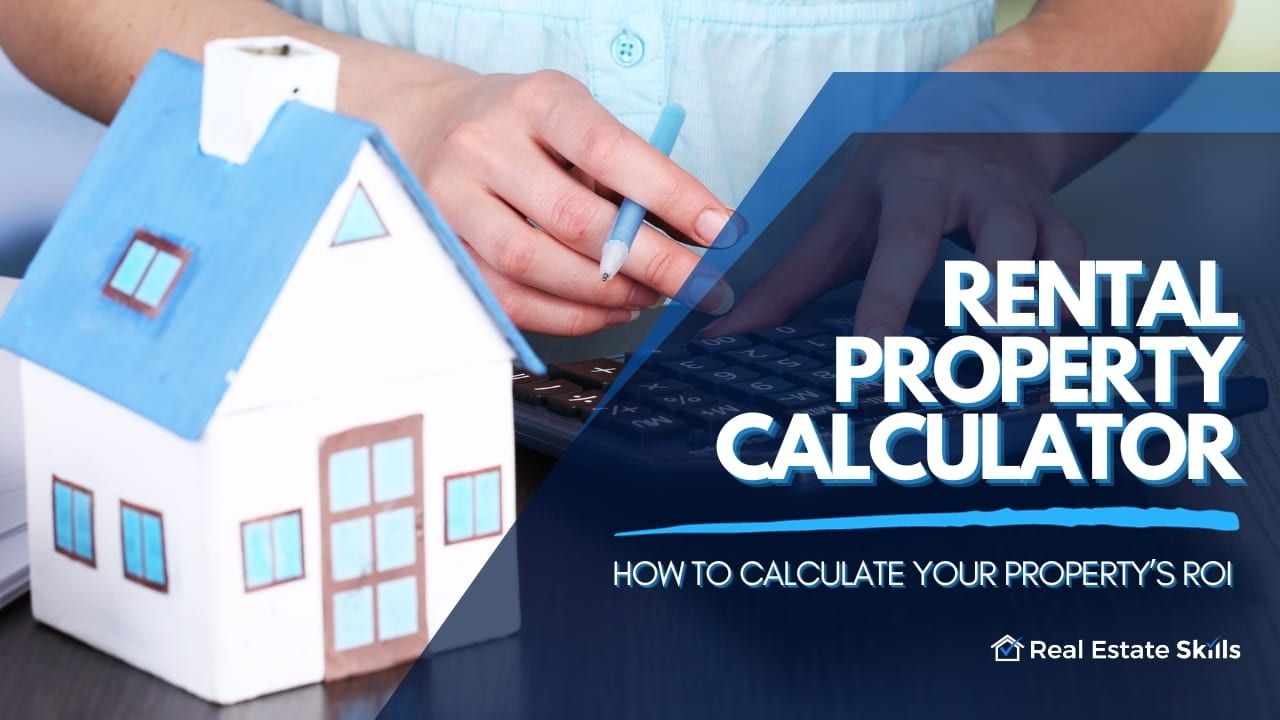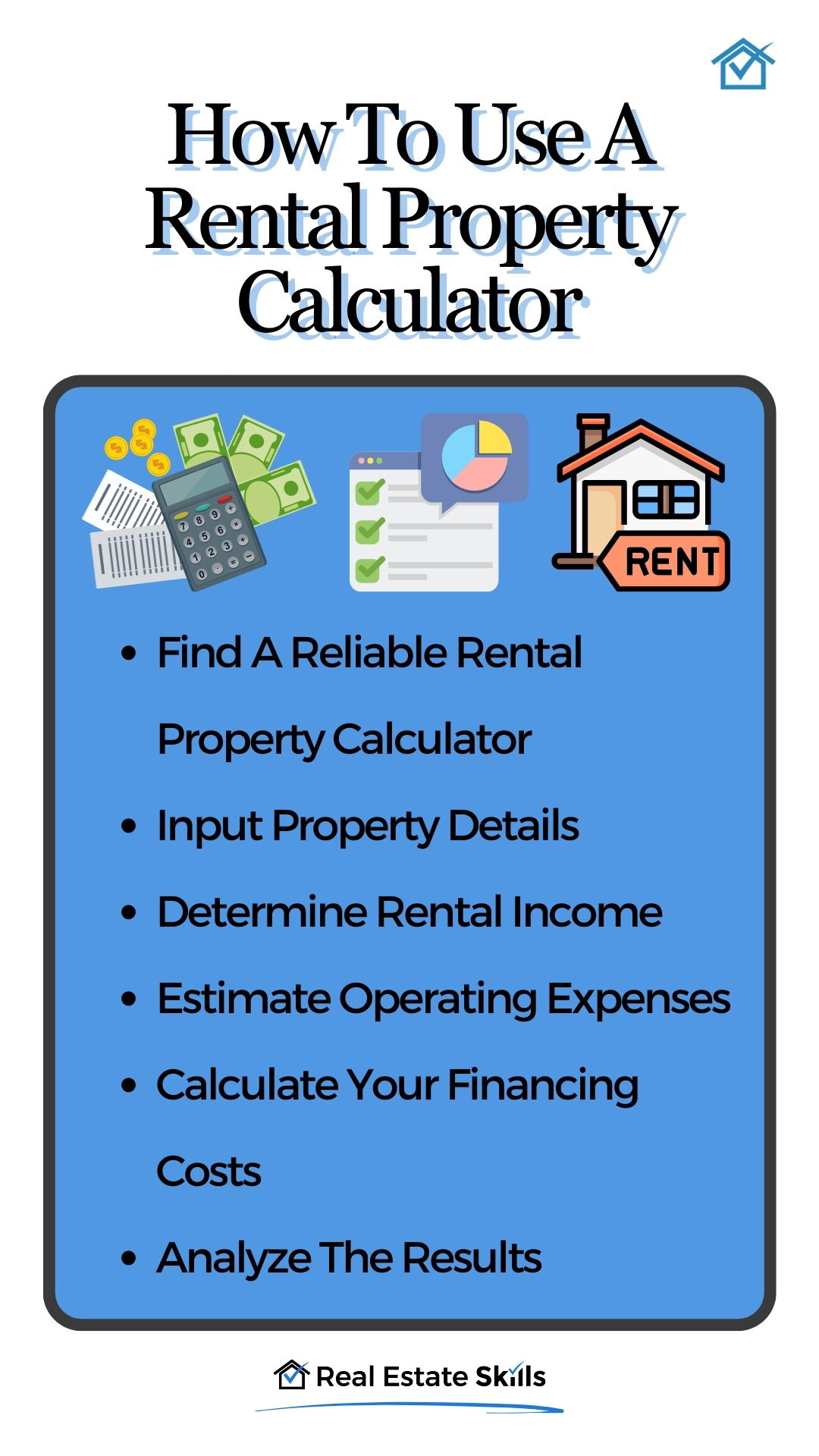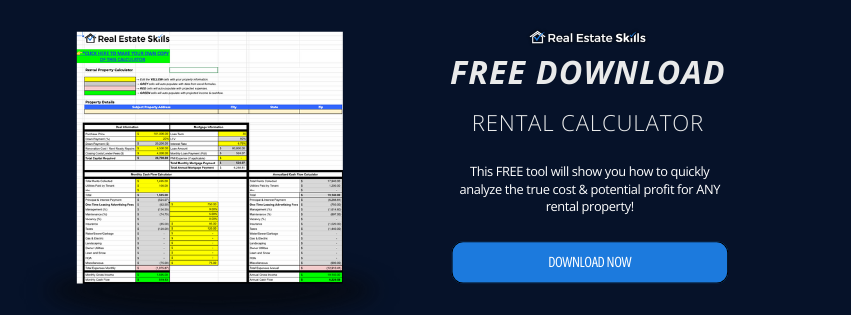Rental Property Calculator: How To Calculate Your ROI
Sep 22, 2025
Investing in rental properties has long been recognized as one of the best exit strategies for accumulating wealth. However, not all rental properties are created equal, and the key to success lies in distinguishing between lucrative opportunities and risky investments. Unsurprisingly, assessing a property's potential, calculating its return on investment (ROI), and making informed decisions is paramount.
This comprehensive guide will explore the mechanics behind using rental property calculators to determine ROI accurately. With this knowledge, investors will be well-equipped to capitalize on today’s best opportunities, ensuring their real estate investments perform as intended.
Whether you're a seasoned investor looking to fine-tune your strategy or a newcomer seeking to understand the fundamentals, our breakdown of how to calculate ROI on rental property will be your indispensable resource for everything you need to know, including:
- What Are Rental Property Investments?
- How To Use A Rental Property Calculator
- General Guidelines For Rental Property Calculators
- What Is Return On Investment (ROI)?
- How To Calculate ROI On Rental Properties
- What’s A Good ROI For A Rental Property?
- Final Thoughts On Rental Property Calculators
Stop guessing on your monthly cash flow.
If you want to ensure you are managing your rental property and all its expenses correctly, you cannot rely on "napkin math." Amateurs lose thousands in untracked deductions because they don't have a system to categorize their spending. Pros treat their portfolio like a business.
One miscalculation on a manual sheet can skew your ROI and lead to a massive headache come tax season. You need a tool that handles the heavy lifting so you can focus on scaling your portfolio.
We have already built the engine for you.
Our professional-grade Rental Property Calculator is pre-loaded with everything you need to stay profitable. It is 100% plug-and-play and ready for your next deal.
Skip the spreadsheet setup and start analyzing like an expert. Download our Free Rental Property Calculator and get the exact template we use to audit our own assets.
Calculating a rental property's ROI empowers real estate investors to unlock their true potential. It's not just about acquiring properties; it's about making sound financial decisions that yield substantial returns. By understanding the intricate details of your investments, such as the value of the property, annual income, and mortgage rates, you can leverage this knowledge to negotiate better terms with lenders, secure more favorable mortgage rates, and identify high-potential real estate deals.
Moreover, knowing your ROI helps you make more intelligent choices regarding your investment portfolio, whether you focus on single-family homes, short-term rentals, or long-term renters. For those exploring how buy a rental property with no money, understanding ROI becomes even more critical, as leveraging creative financing or partnerships can significantly impact your profitability. Ultimately, your grasp of the numbers, aided by investment calculators and rental income calculations, allows you to maximize your monthly cash flow, total cash, and net income – leading you to realize your full potential as a successful real estate investor.
What Are Rental Property Investments?
Rental property investments are a distinct category in the broader context of real estate exit strategies. Unlike house flips, where properties are purchased, renovated, and sold quickly for profit, or wholesaling, which involves selling properties without taking ownership, rental property investments require investors to acquire and hold the property for extended periods of time. Consequently, this strategy focuses on purchasing residential or commercial units, which are then leased to tenants in exchange for regular rental income.
The beauty of rental property investments lies in their potential to generate consistent and passive income streams. These investments allow investors to benefit from monthly rent payments, which can cover not only the property's operating expenses, such as mortgage payments, property management, and maintenance but also yield a surplus—the coveted rental return on investment.
A steady income stream, often called cash flow, distinguishes rental properties from other real estate strategies, making them a reliable choice for those looking to build wealth over time. Understanding how to calculate ROI on a rental property is crucial to evaluating the profitability of such investments and ensuring they contribute positively to your financial portfolio.
How Do Rental Properties Earn Income?
Rental properties generate income primarily through monthly rent payments made by tenants. These rents typically cover various property-related expenses, including mortgage payments, property management fees, property taxes, insurance, and maintenance costs.
Investors receive a reliable income stream, and the goal is for this income to exceed the property's expenses, resulting in positive cash flow. By mastering how to calculate the ROI of a rental property, investors can assess the potential profitability of a rental property before purchasing it. This calculation involves factoring in rental income, expenses, and other variables to determine whether a property is a sound investment choice.
Responsibilities Of A Landlord
Being a landlord comes with responsibilities that real estate investors must be prepared for if they choose to manage their rental properties themselves. These duties include property maintenance, handling tenant issues, ensuring compliance with local laws and regulations, and managing finances related to the property. Property maintenance involves addressing repair requests promptly and conducting routine upkeep, which can be time-consuming but is essential for tenant satisfaction and retaining property value. Handling tenant issues, such as lease agreements, rent collection, and addressing complaints, requires effective communication and problem-solving skills. Furthermore, landlords must ensure their rental properties comply with local housing laws, such as safety standards and fair housing regulations.
However, managing multiple properties can become overwhelming as investors seek to scale their rental property portfolios. That's where property managers come in. Hiring a property manager allows investors to expand their income streams without increasing their responsibilities significantly. Property managers handle day-to-day property operations, from leasing and rent collection to maintenance and tenant interactions. While there's a cost associated with hiring a property manager, many investors find that the added income and reduced stress are well worth the investment.
When assessing potential rental properties, investors can use tools like rental property calculators and cash-on-cash return calculators to help determine whether hiring a property manager fits into their financial strategy.
How To Use A Rental Property Calculator

A rental property calculator is crucial in evaluating potential real estate investments and determining your ROI. Therefore, instead of guessing how to use a rental property calculator, we’ve detailed the steps to use one effectively:
- Find A Reliable Rental Property Calculator: Find a reputable rental property calculator (like the one at Real Estate Skills) or investment property calculator online. There are various free and paid options available. Some popular websites and real estate platforms offer built-in calculators.
- Input Property Details: Start by inputting essential property details, including the purchase price, down payment, and loan terms if you plan to finance the property with a mortgage. Additionally, include variables like property taxes, insurance costs, and property management fees, if applicable.
- Determine Rental Income: Enter the expected monthly rent you anticipate from the property. Research local rental market conditions to gauge a realistic rental income figure.
- Estimate Operating Expenses: Include all operating costs associated with the property, such as property taxes, insurance, maintenance, utilities, and property management fees if you plan to hire a property manager. These figures can often be found in property listings, local tax records, or by consulting with professionals in the industry.
- Calculate Your Financing Costs: If you're financing the property with a mortgage, input your loan's interest rate and terms to calculate your monthly mortgage payments.
- Analyze the Results: Once you've entered all the necessary data, the calculator will provide a breakdown of your potential ROI; this typically includes metrics like cash flow, cash-on-cash return, cap rate, and more.
A rental property calculator takes the guesswork out of real estate investing. It helps investors evaluate whether a potential property will generate the desired returns, allowing them to make informed investment decisions.
Attend our FREE training at Real Estate Skills. Gain insider knowledge, expert strategies, and essential skills to make the most of every real estate opportunity that comes your way.
General Guidelines For Rental Property Calculators
Investing in rental properties can generate generational wealth, but it comes with complexities and challenges. To navigate this field successfully, there are some critical rules and guidelines that rental property investors should follow. These principles help investors make sound investment decisions and ensure their real estate portfolio's long-term profitability and stability.
The following will explore the essential rules and best practices that every savvy rental property investor should at least consider. Whether you're a seasoned pro or just starting, understanding these fundamental principles and how to apply them is crucial.
Read Also: The Ultimate Guide To Real Estate Investment Calculators (And How To Use Them Like a Pro)
What Is The 50% Rule In Real Estate?
The 50% rule is a fundamental guideline in rental property investing, emphasizing the importance of budgeting for expenses that typically consume around half of a property's rental income. This rule suggests that roughly 50% of the rent will cover operating costs, including property taxes, insurance, maintenance, and property management. By adhering to this rule, investors can ensure they allocate sufficient funds to maintain the property and handle unexpected expenses, safeguarding their cash flow and overall profitability. It's a practical benchmark that helps rental property investors plan for the inevitable costs of owning and managing real estate while aiming for consistent returns.
What Is The 1% Rule In Real Estate?
The 1% rule is a rule of thumb in rental property investing that suggests a property's monthly rental income should ideally be at least 1% of its total acquisition cost or market value. For instance, if a property costs $200,000, it should generate a monthly rental income of $2,000.
The 1% rule helps investors quickly assess a property's income potential relative to its price. Adhering to this rule is crucial because it serves as an initial filter to identify properties with better income-generating potential, ensuring investors focus on assets that have a higher likelihood of delivering favorable returns and helping them make sound investment decisions.
What Is Internal Rate Of Return (IRR)?
The internal rate of return is a crucial metric in rental property investing. It calculates the annualized rate of return an investor can expect from their property investment over time, factoring in variables like purchase price, rental income, expenses, and appreciation.
Investors need to use the IRR because it provides a more comprehensive view of the potential profitability of a property, considering the time value of money. By abiding by the IRR, investors can make informed decisions, ensuring that the rental property aligns with their financial goals and they are likely to achieve their desired returns over the investment horizon.
What Is Capitalization Rate & Why Is It Important?
The capitalization rate, or cap rate, is crucial in rental property investing. It measures the property's potential profitability by comparing its net operating income (NOI) to its current market value.
Cap rate is essential for investors because it provides a quick and effective way to evaluate the property's potential return on investment. A higher cap rate generally indicates a more attractive investment, but it's essential to consider other factors like location, property condition, and market trends to make well-informed investment decisions.
Using cap rates in their calculations, investors can quickly assess whether a rental property aligns with their financial goals and investment strategy.
What Is Return On Investment (ROI)?
Return on investment is a financial metric used to evaluate the profitability of an investment. For rental property investors, ROI measures explicitly the gain or loss generated from a rental property relative to the amount invested. It's a vital indicator of a property's performance and can help investors assess their real estate investments' efficiency and potential profitability.

ROI varies for different types of real estate professionals. ROI accounts for rental income, property appreciation, and tax benefits for buy-and-hold investors. Wholesalers focus on assigning contracts and earning a profit by selling the rights to purchase a property to another investor. Their ROI depends on the price difference between the original and resale contracts. Rehabbers, on the other hand, invest in property renovations to increase its value. Their ROI considers the purchase and renovation costs (minus the selling price) to determine their profit.
Understanding the nuances of ROI is essential for rental property investors as it helps them gauge the financial viability of their investments, make informed decisions, and maximize their returns in the real estate market.
How To Calculate ROI On Rental Properties

Calculating the ROI for a rental property is crucial in assessing its potential profitability, especially for new investors. As a result, we’ve included a simplified step-by-step guide to help investors understand the process:
First, gather all the necessary financial data related to the rental property; this includes the purchase price, annual rental income, operating expenses (property taxes, insurance, maintenance, etc.), financing costs (if you have a mortgage), and an estimate for property appreciation.
Next, calculate the gross rental income by subtracting the vacancy rate (typically 5-10%) from the annual rental income. This adjustment accounts for potential vacant months, giving you a more realistic income figure.
Determine your operating expenses by adding up all annual costs associated with the property.
Calculate the net operating income (NOI) by subtracting the operational expenses from the gross rental income. NOI represents the income your property generates after covering its basic costs.
If you have financing costs, such as mortgage interest and origination fees, subtract them from the NOI to get your net cash flow.
Estimate property appreciation by applying the expected annual rate to the property's current value. This step accounts for potential property value growth over time.
Finally, calculate the ROI by adding the net cash flow and property appreciation, then divide that sum by your total investment (purchase price plus upfront expenses like closing costs and initial repairs).
A positive ROI indicates the potential for a profitable investment, while a negative ROI suggests the need for further evaluation or considering other investment opportunities. Rental property calculators can simplify these calculations and help you make informed investment decisions.
Read Also: Tax On Rental Income: How Much To Pay & More
What’s A Good ROI For A Rental Property?
A good return on investment for a rental property typically falls in the range of 8% to 12%. However, this can vary depending on location, property type, and individual investment goals. It's crucial to remember that ROI is just one factor to consider; factors like property appreciation, cash flow, and long-term wealth-building potential are equally important.
Comparatively, the ROI for flipping houses tends to be higher. ATTOM Data Solutions’ latest Home Flipping Report says the average flipping profit translated to “a 22.5 percent return on investment compared to the original acquisition price.” Flippers aim to buy low, make renovations, and sell quickly for a profit. It's a higher-risk, higher-reward strategy often involving more work and shorter-term investments.
On the other hand, wholesaling usually provides a lower ROI than rental properties and flipping. Wholesalers profit by finding great deals and selling them to other investors. While the ROI might be lower, wholesaling involves less risk and requires less capital, making it an attractive entry point for many investors.
A "good" ROI ultimately depends on your investment strategy, risk tolerance, and financial goals. That said, the concept of a good ROI is undeniably relative and varies from one investor to another. What one investor views as an attractive return might not align with the goals of another. It all boils down to the amount of money invested, monthly income generated, and the total cost of ownership.
Factors like debt service, HOA fees, loan amounts, and even repair costs come into play. Rental property owners working with property management companies may prioritize lower involvement but are willing to accept slightly lower returns. Using cash flow calculators, others might seek higher returns and be ready to manage the property more hands-on.
Read Also: Wholesaling Rental Properties: The (ULTIMATE) Guide
Final Thoughts On Rental Property Calculators
Calculating a rental property's ROI is vital for any real estate investor. If for nothing else, the ROI is the compass that guides your investment decisions, helping you identify profitable opportunities and avoid pitfalls. With the information above, you'll be better equipped to make informed choices, maximize your profits, and build a successful rental property portfolio that generates long-term wealth and financial security.
At Real Estate Skills, our team of experts is ready to provide the tools you need to calculate a rental property’s ROI. We're committed to providing the knowledge, resources, and support you need to make the best decisions possible. So avoid common mistakes and maximize your returns by leveraging our expertise.
If you’re serious about doing your first real estate deal, don’t waste time guessing what works. Our FREE Training walks you through how to consistently find deals, flip houses, and build passive income—without expensive marketing or trial and error.
This FREE Training gives you the same system our students use to start fast and scale smart. Watch it today—so you can stop wondering and start closing.
*Disclosure: Real Estate Skills is not a law firm, and the information contained here does not constitute legal advice. You should consult with an attorney before making any legal conclusions. The information presented here is educational in nature. All investments involve risks, and the past performance of an investment, industry, sector, and/or market does not guarantee future returns or results. Investors are responsible for any investment decision they make. Such decisions should be based on an evaluation of their financial situation, investment objectives, risk tolerance, and liquidity needs.








